Dymo LabelWriter Duo Review
Dymo LabelWriter Duo
This Dymo LabelWriter has two heads, hence the name, and as far as label printers go, it's up there with the best.
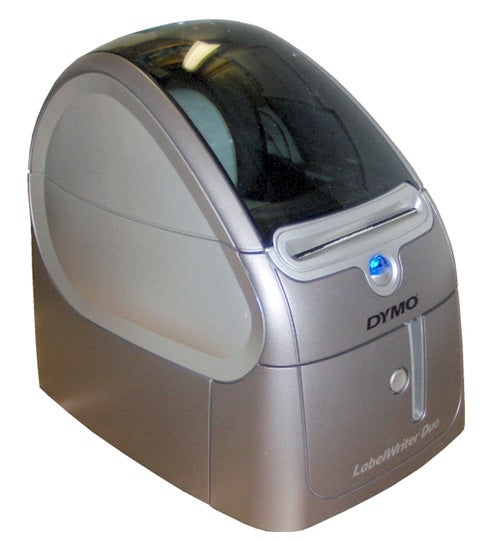
Verdict
Key Specifications
- Review Price: £134.41
It’s a while since we’ve looked at label printers, but the release of Dymo’s LabelWriter Duo is enough of an event in the label printing world to warrant a review. The key feature of this printer, which differentiates it from most other label printers, is that it has two print heads – one for paper address-type labels and the other for more robust, plastic labelling tape.
Looking like something out of RoboCop, the LabelWriter Duo sits quite high off the desk for a label printer and its two-tone metallic case is nearly all curves. There’s a large, blue, power light on the front and a smoked plastic dome on top, so you can see the status of your label roll. Paper labels feed out through a horizontal slot at the top of the front fascia, while tape feeds out vertically, lower down.
At the back you’ll find a USB port for connection to your PC and a socket for power, which comes from a separate, kick-around-under-the-desk, black block supply.
Press a small button on the front of the printer and a powered tray slides out, reinforcing the cyborg policeman analogy. The only thing it gives access to, though, is a tape cartridge – less exciting than a laser pistol, but probably of more use in a small office.
A paper label roll fits in a spool at the top, in a more conventional manner, and feeds into the print head automatically. Dymo has worked really hard on the ease-of-use of the LabelWriter Duo and it’s pretty straightforward to load and maintain.
The specialist purpose of any label printer means the control software is a lot more important than in a typical printer. Dymo supplies a custom-written utility for label printing called, with inspiring candour, Dymo Label Software. This program handles the design and print of both paper labels and plastic tapes and you can include graphics and a wide variety of barcodes in both.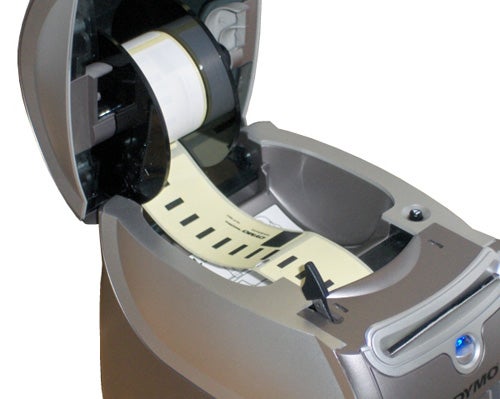
Dymo supplies a wide range of paper labels, including tiny numbering labels, doughnut-shaped CD labels and larger address labels. The software knows about them all and adjusts to show the correct size of label as you’re working. Tapes come in five different widths and again the software enables you to custom design your text and graphics to fit.
There’s an address list database built into Dymo Label Software, so you can keep frequently used addresses on tap. You can import from any comma-delimited file, but it would be useful to be able to take your Outlook or Outlook Express address book and share it directly with the program, which isn’t possible.
What you can do is to highlight any address in a Word document or any row of cells in Excel and click on the label icon, which is automatically added to the toolbars of both programs during the LabelWriter Duo installation. This calls up a small label print dialog and is a very quick and easy way to print a one-off label.
There’s not much to say about the print speed. It’s pretty instantaneous; once you’ve typed the label details or selected them from the address list, a label prints without hesitation and completes in under a second. With tapes, the speed obviously depends on the length of the label, but a 15 to 20cm label again comes out in under a second.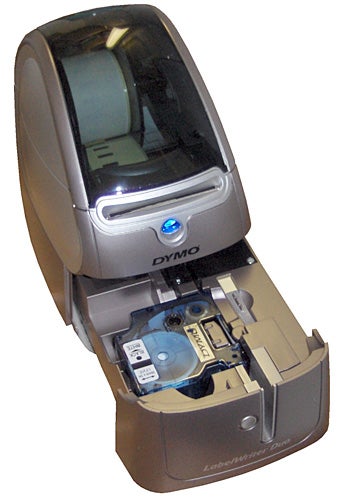
The printer uses thermal print heads for both paper labels and plastic tape, so results are black only, but a good, dense black in both cases. You need to be aware that thermal printing on paper is prone to light fade and Dymo admits in the LabelWriter user guide that if you label something which catches sunlight you’ll start to notice fade after about 18 months. Given the results of our fade tests on inkjet print, though, this can still be considerably longer than with some inkjets.
Print on plastic tape is, according to Dymo, not subject to fade in the same way and the company claims the tapes last pretty much indefinitely.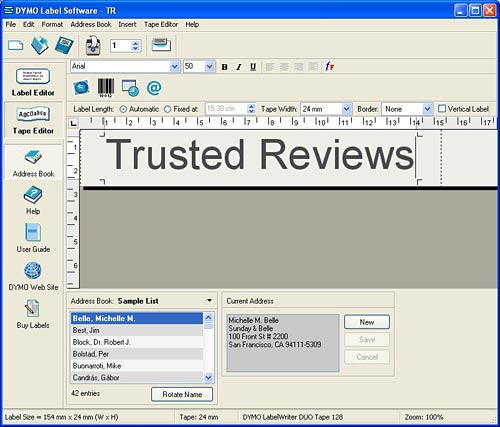
Maintenance on this machine is a doddle, as the only consumables you have are the labels and tapes themselves. However, this doesn’t necessarily make it cheap to run as it depends on the prices charged for the labels and tape. Because there’s a variety of different media available, we used the large address label and 24mm tape supplied with the printer as the basis for costing.
Dividing out the number of labels and 10cm lengths of tape (although you can print to any length, of course) by the cheapest prices we could find gives figures of 2.0p for a label and 15.8p for a tape. Neither of these prices is particularly cheap, when compared with a sheet of labels put through an A4 printer, but you’re paying here for the convenience of individual labels and tapes.
”’Verdict”’
This is an extremely well-made and versatile printer for handling the specialist task of printing labels. Having the facility to print on robust plastic tape is a bonus and although the running costs aren’t low, the results the LabelWriter Duo produces look professional and are supremely easy to produce.
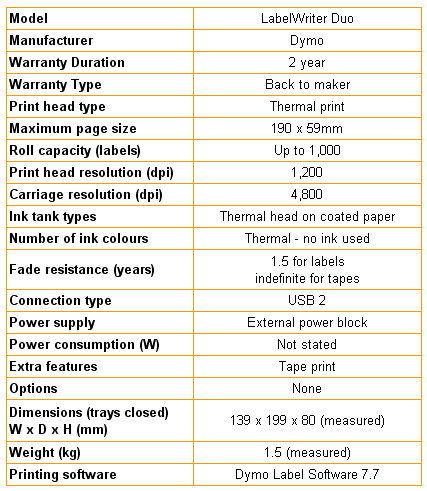
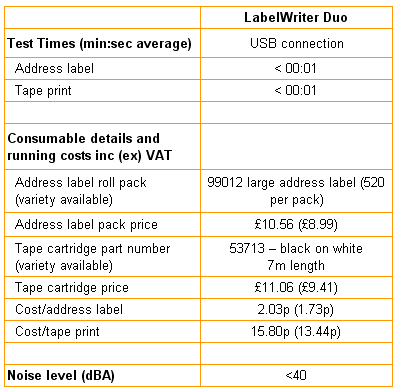
Trusted Score
Score in detail
-
Print Speed 10
-
Features 9
-
Value 7
-
Print Quality 8

